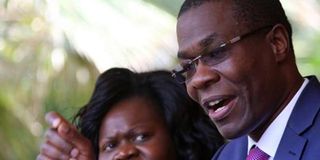Call to boycott Kenyatta firm products

Ugunja MP Opiyo Wandayi (right) and Homa Bay Woman Representative Gladys Wanga at a press conference held by ODM lawmakers at Orange House in Nairobi on August 19, 2015 on the uproar over sugar imports from Uganda. PHOTO | EVANS HABIL |
What you need to know:
- Opposition claims Brookside Dairies stands to gain a lot from deal at the expense of sugarcane farmers in the country.
- Cabinet Secretary and traders’ lobby defend agreement, saying no deal was reached on sugar importation.
The Opposition on Wednesday called for a boycott of milk products from a firm associated with President Uhuru Kenyatta, to protest the proposed "cheap sugar" deal with Uganda.
Some MPs called on Kenyans to boycott milk from Brookside Dairies, saying the firm would benefit greatly from the deal at the expense of local sugar farmers who would suffer as a result of “cheap sugar” imports.
“As we prepare to move to the ground this Friday we call on our people to rethink their relationship with the companies in whose name our sugar sector is being killed. We ask you to boycott the milk that is to be exported to Uganda,” said the party in a statement read by Busia Woman Representative Florence Mutua at Orange House in Nairobi.
They said it was wrong for Jubilee politicians to invoke Mr Odinga’s name every time they were challenged over their failure to tackle corruption.
“No nation ever developed by abandoning its products. The US imposes quotas on Toyota to protect its auto industry. We ask Kenyans to buy Mumias, Sony, Nzoia, Chemelil and Muhoroni sugar and build our country,” the party added.
Ms Mutua was accompanied by seven ODM lawmakers, who demanded that the agreement be made public so that Kenyans could know its benefits.
“Kenyans should be told what is contained in the agreement. Kenyans are not fools to be taken for a ride,” said Ugunja MP Opiyo Wandayi.
NEW TWIST
These calls by the Opposition add a new twist to the sugar saga even as the Kenya National Chamber of Commerce and Industry, whose leaders accompanied President Kenyatta to Uganda, explained that the agreement was for the removal of administrative obstacles — non-tariff barriers — that blocked the entry of Ugandan sugar into the local market.
The memorandum of understanding, said the chamber's chairman, Mr Kiprono Kittony, was signed between the Kenyan and Ugandan chambers on August 11.
Mr Kittony said the sugar issue had been over-politicised, adding that key in their discussions with Uganda was how a stakeholder meeting should be held to iron out issues and to speed up the formation of the East Africa Sugar Board to handle sugar imports.
“Any other discussions on sugar were held at government levels, Uganda had proposed that Kenya lift some non-tariff barriers on sugar and that could have been the subject of discussions,” said Mr Kittony.
Foreign Affairs and International Trade Cabinet Secretary Amina Mohamed, who was in the delegation, reinforced the chamber boss’s position that no deal was signed with Uganda to allow its sugar into the local market.
“If an instrument was signed between the two countries, it would already be out in the media. There was no instrument on sugar that was signed. Discussions were held on all commodities which we exchange through trade between the two countries,” she said in an interview.
OBSTACLES TO TRADE
The memorandum was prompted by complaints from both Ugandan and Kenyan business people, who lobbied their respective presidents to lift the non-tariff barriers that were impeding trade between the two countries.
While Ugandan businessmen were more concerned about the obstacles hindering sugar exports to Kenya, their Kenyan counterparts were facing the same issues over exports of beef, dairy products and rice.
The Opposition has, however, taken advantage of the government's failure to disclose the details of the agreement to contend that President Kenyatta signed the deal with Uganda to flood the Kenya market with cheap sugar.
The dispute has escalated into a dirty personal war between Deputy President William Ruto and Cord leader Raila Odinga.





